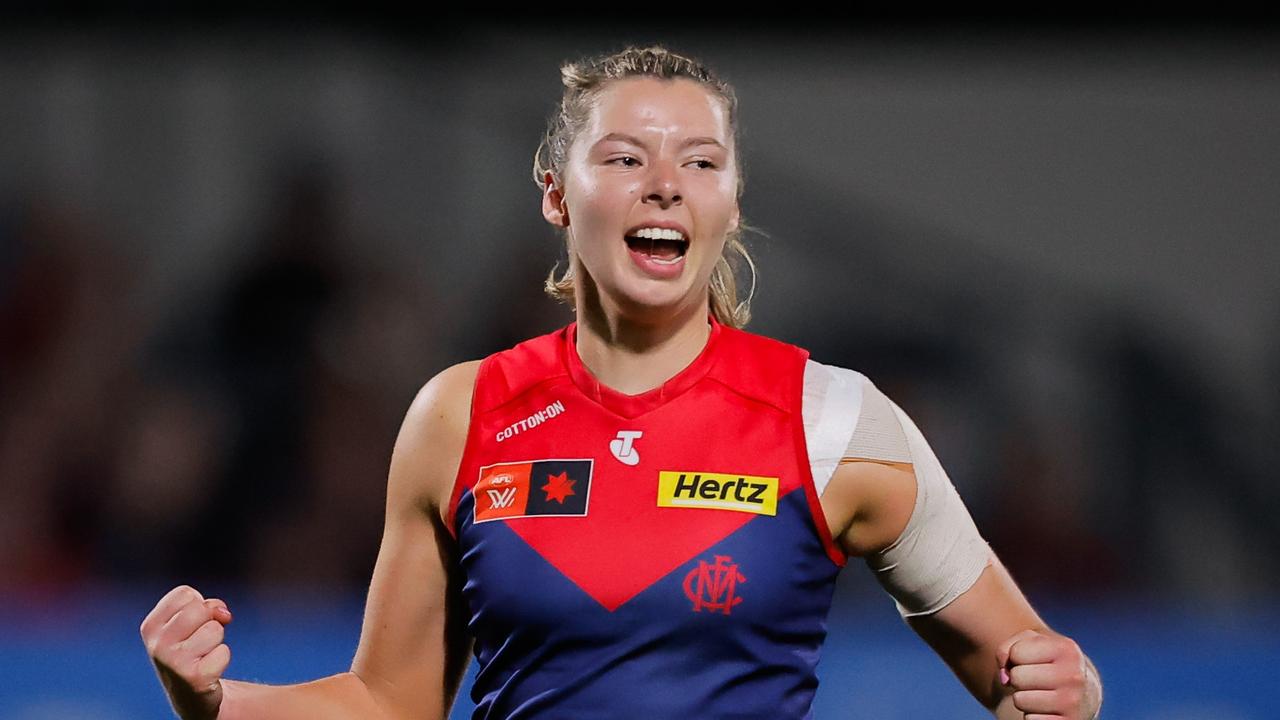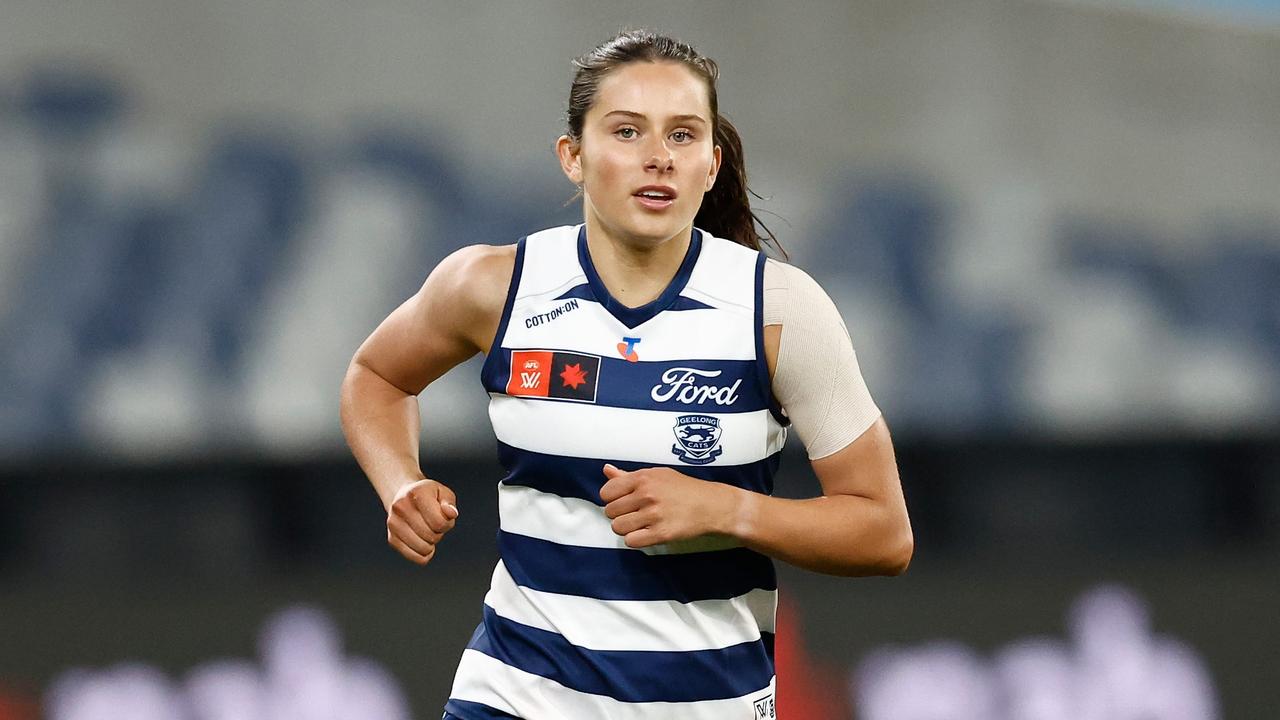AFLW finals news: Swans CEO Tom Harley details the rise of Sydney’s women’s team
A big factor behind the Swans’ push for an AFLW team was do it once, do it right, now those fruits have come to bear. Swans CEO Tom Harley talks to Lachlan McKirdy about their rapid rise.

AFLW
Don't miss out on the headlines from AFLW. Followed categories will be added to My News.
Do it once, do it right.
It was the overriding factor behind the Sydney Swans’ push for an AFLW team.
One of the competition’s newest clubs, the Swans have made waves in their second season after progressing from a winless year to finishing inside the top eight.
They’ve created a culture embraced by their fans at record levels, and on the field, Scott Gowans’ side is uncompromised in their desire to play exciting attacking footy.
It’s a testament to the exhaustive work put in by the Swans as they eye off long-term success. But it was far from an easy journey, and it stemmed from a defiant resistance to not just hope for the best.
WHY THE SWANS HAD TO SAY NO
In 2016, the Swans had spent months putting together their pitch to enter the AFLW competition.
With limited licenses available, they knew that the presentation had to be perfect if they wanted to be one of the inaugural teams.
“We took that process really seriously,” Tom Harley, Swans’ CEO said.
“We knew we had enormous support from our fan base … we were confident we would be well supported. So we embarked on a diligent tender process and did all the requisite reconnaissance.”
But as the board met to go through their final proposal, thoughts lingered about the promises they were making.

While building a successful women’s side was a top priority, concerns began to filter through that they wouldn’t be able to give it the tools needed to succeed.
“I vividly remember the day before a board meeting, as a club executive we sat around the table and went through with a fine-tooth comb our tender,” Harley said. “It was a 152-page document, it was really detailed.
“At the conclusion of that meeting, we made what I think was a really brave decision, not necessarily a popular one, to say we’re just not ready to go.”
The decision stemmed from two factors. Firstly, the lack of infrastructure at the Swans to support a women’s team, and the lack of pathways for young girls to play footy in Sydney.
“At the time we only had one female shower in the whole of the SCG, so I don’t know how that was going to work,” Harley said.
“Given where the salaries were back then, we’d also have to bring most if not all of the players from outside of Sydney.
“So, we didn’t submit. I don’t know how many teams didn’t submit, but there weren’t many.”
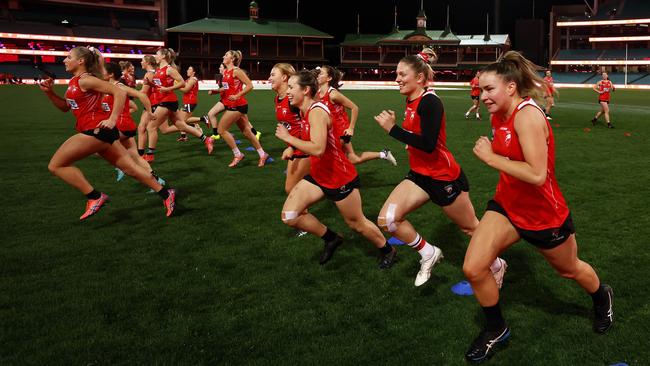
The response from most Swans fans was frustrated understanding. While they were desperate to throw their support behind a women’s team, they accepted the reasoning they were given by their club.
“It’s core to our DNA that we invest in our football programs to give our teams the best chance of success,” Natalie Fagg, the Swans’ EGM of Customer Services said.
“As hard as it was, we knew we couldn’t do it. You couldn’t do one incredibly well and not the other one.
“Personally, it was really challenging. Our fans understood that too. I do remember some conversations with fans … some were a journey, some were understanding, but that doesn’t mean it wasn’t disappointing for fans.”
“A cohort of our Swans members who regardless of how well prepared we were, just wanted a team – my wife being one of them,” Harley added.
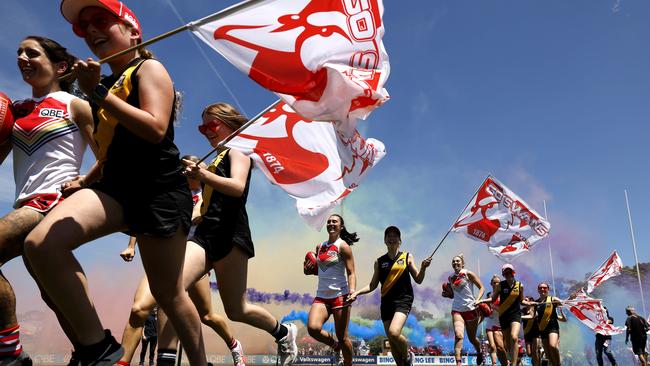
GOOD THINGS COME TO THOSE WHO WAIT
The frustration of not being in a place to support a women’s team acted as a catalyst for the Swans to spring into action.
They set up the youth girls pathway at the QBE Sydney Swans Academy which now has over 300 participants. It also fastracked the development of their new HQ at the Royal Hall of Industries at Moore Park.
Because they didn’t bid for one of the initial licenses, the Swans were not eligible for the next stage of entry. But they were eventually accepted ahead of season seven of the competition.
“I was very keen for us to be the beneficiaries of being the final adopter of AFLW,” Harley said.
“It’s now what we dreamt it would be,” Fagg added. “The timeline changed in 2022 and the season got brought forward, but we just made it work.”
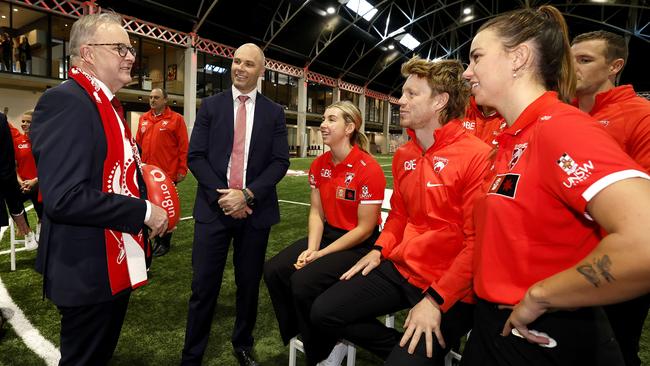
The key aspect the club learned from watching other AFLW clubs was the importance of integration across the club. They wanted the men’s and women’s sides to work together towards a common goal and that became the new focus.
Harley helped appoint Kate Mahony as the manager of women’s football, one of the sharpest sport administrators in Australia.
While the club’s best minds came together to find the perfect coach in Scott Gowans.
“We hadn’t had any experience with a women’s program, so I was keen to get someone who was experienced, and importantly passionate about coaching women’s footy,” Harley said.
“It was part of identifying the things we don’t know about women’s footy.
“John Longmire sat in Scott Gowans’ interview as an example. There was a great scene when Scott was talking his game plan and the differences of the men’s and women’s game, and then John challenged him a little bit on team defence, and they were having a bit of a tete-a-tete around that. It was great.”
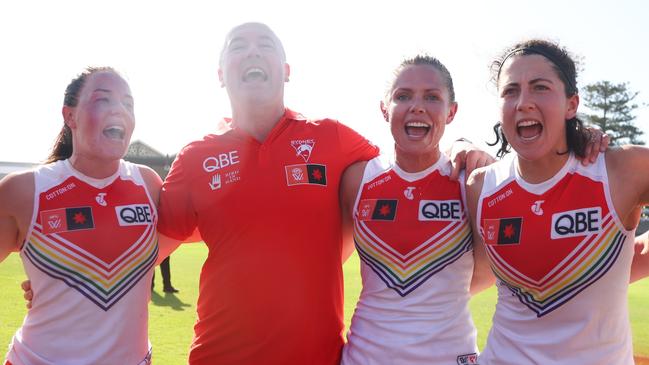
The Swans’ struggles in their first season have been well documented but they never had any doubt the pieces were there to create an incredible culture going forward.
And as they prepare to take on Gold Coast in their first-ever AFLW final, even they are still coming to terms with how quickly progress has been made.
“From a football perspective, we do set ourselves lofty goals,” Fagg said.
“But as a fan for a second, if I went back into that [board] room and said we’d be in a top-eight position in our second season, I would have taken that every day of the week and twice on Sundays.”
“I get genuine satisfaction out of the joy that the program brings to our club internally and then the joy it brings to our supporter base,” Harley added. “I’ve been involved in the game a long time … to have the chance to be involved in the build of an AFLW team has been one of the things I look back on most fondly.
“I’ve got no doubt the players feel that, and it’s contributed to some really strong performances and now they’ve earned their right to have a crack in the finals series.”




